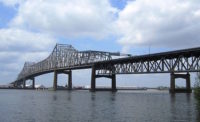In explaining his decision to sell his company, Tishman Construction, to AECOM Technology Corp., Daniel R. Tishman notes that the company lacked the very deep financial resources needed to establish new overseas offices and maintain itself as a major market player. “It’s a very expensive proposition to open an office in the Middle East,” he said onJuly 19 in New York City.

And with those words, the respected leader of one of construction’s most famous family-owned companies summed up why AECOM and its competitor, URS Corp., have been able to acquire planetary mass to make themselves the dual centers of a new universe of engineering megafirms. AECOM is rich with cash from earnings and a 2007 initial public offering and needs to put more of its cash to work. Together with URS, AECOM has consolidated and provided buyout capital in a field that otherwise would be starving for investors.
Tishman has tremendous opportunities to export its expertise and services but lacks enough capital. With its cash and existing network of clients in 100 countries, AECOM has the means for Tishman to work in many more countries.
The same forces that open international competition also cause owners to treat construction services as a commodity. That’s why the firm’s at-risk services have been as high as 40% of Tishman’s roughly $1 billion in annual revenue.
Tishman has prided itself on controlling risk in a way that never exposes the firm to big cost overruns. Daniel Tishman quoted his father as saying he never wanted to find himself negotiating “on the other side of the table by taking too much risk from the owner.” That careful control of risk and exposure helps explain why fellow New Yorker and AECOM CEO John Dionisio was willing to pay $245 million—$202 million in cash, for Tishman—and to make Daniel Tishman AECOM’s vice chairman. (He will be paid an annual base salary of $600,000, plus a possible performance bonus of $550,000 in cash or shares.)
A major strategic decision underlying other key acquisitions of recent years—the URS 2007 buyout of Washington Group International, for example—is whether engineering-based firms should engage in construction. Tishman inches AECOM further into construction services but within a framework of careful financial risk control.
“Things could change, but clearly we didn’t want to take the risk of self-performing construction,” Dionisio said in a phone interview with ENR. “[Tishman] takes us right to the edge where we could become a player.”
Tishman’s profile does appear to be different from the traditional services offered by AECOM. Tishman tends to see the industry through the eyes of a contractor, not those of an engineer. But Dionisio says Tishman takes on risk “mainly for [its] fee only.”
The recession has elevated the risk of unpaid fees by financially troubled clients. According to industry sources, Tishman has escaped from any trouble involving MGM Resorts International, which is the owner of the recently opened CityCenter; Tishman Construction served as executive construction manager on the City-Center project. MGM Resorts is negotiating with its general contractor and subcontractors over what is reported to be $492 million in unpaid bills.
The first word from Wall Street on the AECOM-Tishman deal is positive. Avram Fisher, an analyst who follows AECOM for financial adviser BMO Capital Markets, likes that AECOM is gaining Tishman’s “low-risk, high-margin fee-based business.”
Fisher estimates that, excluding pass-through costs on a net revenue basis, the earnings before interest, taxes, depreciation and amortization on CM fees can ran range in general from 15% to 20%, which, is “above the 9% range of AECOM’s core business,” Fisher wrote.
Following this logic, wrote Fisher, “this seems to imply” that AECOM paid seven times Tishman’s earnings.
Without AECOM and URS, sellers such as Tishman and Washington Group would have been unlikely to get as much for their companies, says one veteran executive unconnected to either firm. “It’s unlikely another contractor could have paid as much,” he says. One executive says Tishman’s AECOM board seat and vice chairmanship, combined with the mostly cash buyout, “seems like a great deal.”
Owned by Daniel Tishman, family members and one longtime employee, Tishman Construction had in the past been both privately held by the Rockefeller Center Corp. and publicly owned before being bought back by the family. So another ownership change isn’t unfamiliar or unwelcome, even to John Tishman, Daniel’s 84-year-old father, who is said to approve of the deal.
With offices in several U.S. cities, Tishman has been able to expand into Abu Dhabi. Now the company can pursue projects in more countries on the financial wings provided by AECOM.







